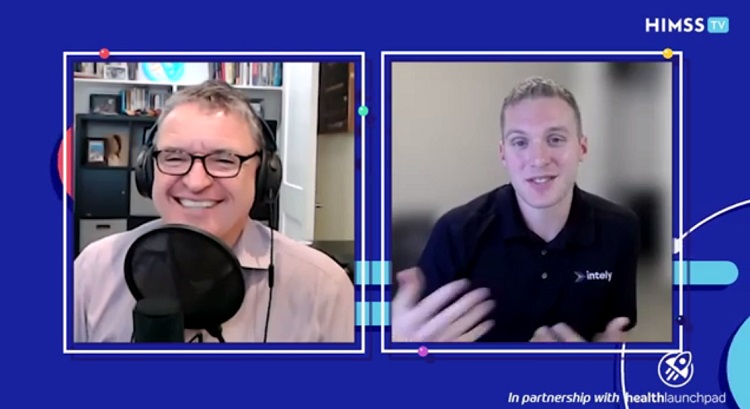In this podcast brought to you in partnership with HIMSS, Daniel Pluard, the CEO of Intely, a healthcare interoperability start-up, shares about their low-code/no-code approach to tackling the highly complex issues in automation workflows.
Daniel speaks with Adam Turinas, the CEO and founder of healthlaunchpad, and shares valuable start-up insights and tips touching on:
- His career background and Intely’s mission
- Why and how they got started
- What the challenges have been
- Who they are selling to, and what problem they solve for them
- The startup life
- How they sell and market their brand
- Who do they go to for help and advice?
- What they could do if money wasn’t a problem
- Lessons Learned/Pieces of Advice
Podcast Video: The Start-up Journey – Daniel Pluard, CEO of Intely
Start-up Journey – Podcast Summary
1:44 Daniel Pluard’s Background & Intely’s Mission
The discussion begins with Daniel talking about:
- His current position as the CEO and co-founder of Intely
- Intely as a healthcare platform offering low-code/no-code interoperability services
- Their mission of integrating many healthcare systems and applications
- Their target customers: digital health, healthcare technology products, and providers
- His healthcare technology background – experience at Cerner( currently Oracle Cerner)
How They Got Started & Challenges Faced
In the podcast, Daniel talks about the gaps he saw, how he took time to learn, how they started, and the challenges they faced due to different reasons.
During the discussion, he explains that:
- They didn’t continue focusing on areas that didn’t work and took a path that worked for them
- They saw the need to work outside EMR implementation and instead pursued the integration of healthcare ecosystem products.
- As a start-up, you ought to listen to feedback and realign your mission to what solves people’s problems.
- You should not stick with your initial mission if it doesn’t provide a solution
11:20 Daniel On Intely’s Structure, Funding, & Customers
Further in the podcast, Daniel shares that:
- Their start-up is about one year old
- They have got a small team of about ten full-time employees and five contracted specialists.
- They are currently self-funded.
- The right people he got introduced to, which includes his co-founder, have helped drive their growth.
- They currently have pilot customers.
- Their target partners and customers are health technology service providers
17:31 – Start-up Selling & Marketing
In the podcast, David also talks about the different selling and marketing channels they use, such as emails, websites, and social network channels.
He points out that being a start-up:
- They aren’t still well-known, and their leads are mostly inbound
- They are keen on making new connections at face-to-face events
- They work on identifying the right people for support through their thoughts, inputs, and advice and those who can believe in them.
20:29 Who To Go To For Help & Advice
On where to go for help or advice, Pluard explains:
- They go to people with specific skills or experience
- His co-founder and others he has met over the years have provided adequate help and support
- The Internet, through Google search, has proved to be a valuable source of help and insights
- When one works on a solution and fails, one gets better prepared next time
- Through learning, one gets better at developing different aspects of their projects.
26:22 – David Pluard – Relationship With Competitors
On how they relate with their competitors, David explains:
- They connect with them through conferences, but not much because of the virtual nature of their services.
- They love and respect them but keep a healthy distance from them
- Through customers’ feedback, they learn about what they like or don’t like about their competitors
28:25 David’s View – If Money Is No Longer A Challenge.
In a situation where money is not a problem for their start-up, David’s view is that:
- It can be dangerous because, in business, there are limits that, if not well-managed, things may get haywire.
- There is a need for more breathing room to help in working on branding strategy, marketing coordination, and Sales Operations.
- Though having more resources would be nice, companies that have grown too fast have had to lay off some of the people they had brought on board which, to him, is a sad situation.
Daniel Pluard’s Advice on Lessons Learned
As the podcast comes to a close, David shares the following pieces of Advice or tips based on what he has learned through experience:
- Be patient because everything takes longer than it appears in your mind!
- Remind yourself that everyone you admire was in your situation, and somehow, they got through it.
- Learn to be unique and find what works for you – Solve problems uniquely and deliver unique value.
Podcast Subscription
You can subscribe to this podcast on Apple, Spotify, or any of your favorite podcast applications.
We have got great programs for guests coming up.
If you have got any ideas, please, let me know through Adam@healthlaunchpad.com.
And if you like this podcast, share it with a couple of people so they can listen and learn. Thank you!

